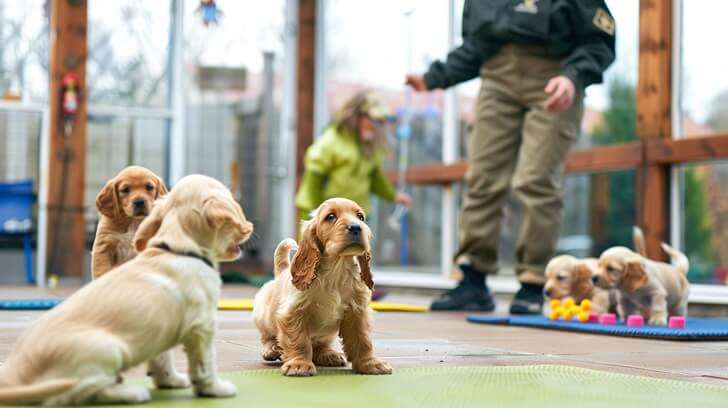
Welcoming a puppy into your home is an exhilarating journey filled with joy, laughter, and companionship. However, one crucial aspect of raising a well-adjusted dog that many new pet owners often overlook is early socialization in puppies. Socialization is the process of exposing your puppy to various people, environments, sounds, and experiences to help them develop into a confident, well-behaved adult dog. Early socialization is not just about making your puppy friendly; it lays the foundation for their behavior and reactions throughout their lives.
Studies show that the critical window for puppy socialization occurs between 3 and 14 weeks of age. During this time, puppies are more receptive to new experiences, and positive interactions can significantly shape their personality and temperament. Failure to socialize your puppy adequately can lead to behavioral issues, anxiety, and fearfulness as they grow. This article delves into the importance of early socialization, the benefits it offers, practical tips for implementation, common pitfalls to avoid, and scientific backing for why socialization should be a priority for every puppy owner. By understanding the importance of socialization, you can help ensure your puppy develops into a well-rounded and happy adult dog.
Key Benefits of Early Socialization in Puppies
1. Builds Confidence and Reduces Fear
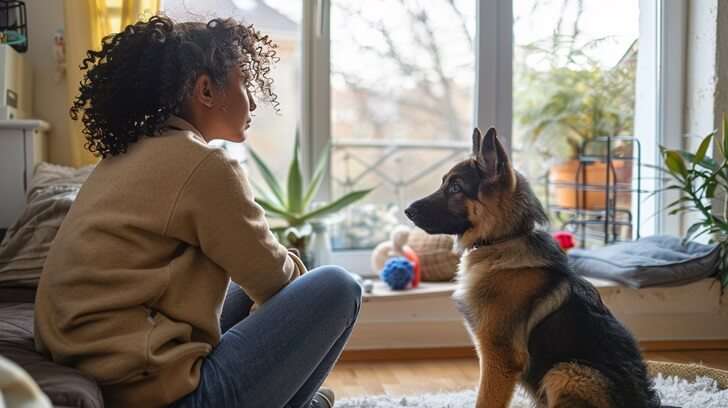
One of the most significant benefits of early socialization is that it helps build a puppy’s confidence. Exposing your puppy to various environments, people, and animals can prevent fear-related issues later in life. Puppies that are not socialized often develop phobias of certain sounds, objects, or situations, leading to anxiety and behavioral problems.
For example, a puppy who has never encountered a vacuum cleaner may react fearfully when they first see one. In contrast, a puppy who has been exposed to a vacuum in a positive context is more likely to remain calm. By gradually introducing your puppy to new experiences during their critical socialization window, you help them learn to cope with various stimuli, making them more adaptable as they mature.
Socialization helps puppies understand that new experiences do not pose a threat. It’s not just about getting them used to new sights and sounds; it’s about teaching them how to process those experiences without fear. Confident dogs are generally happier and more willing to engage with their environment, which is essential for their overall well-being.
2. Encourages Positive Behavior and Reduces Aggression
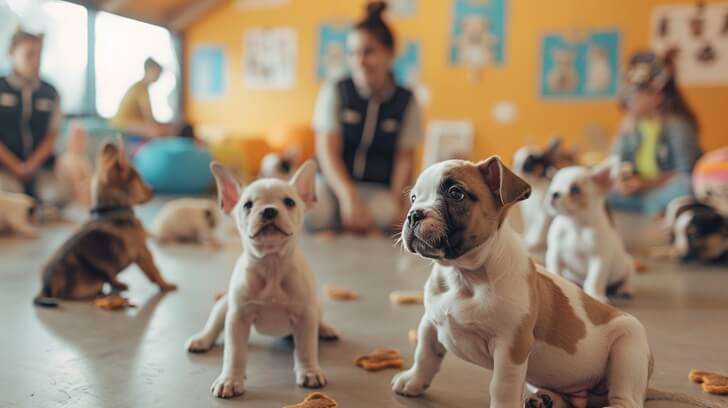
Socialization is crucial for teaching puppies proper social skills. When they interact with other dogs and people, they learn how to communicate effectively, read body language, and respond appropriately to different social situations. This early exposure helps reduce the likelihood of aggressive behaviors that can arise from fear or uncertainty.
For instance, a well-socialized puppy learns how to play gently, recognize boundaries during play, and understand signals from other dogs. Without these skills, a puppy may become overly dominant or fearful, leading to aggressive encounters. By ensuring your puppy has plenty of positive social experiences, you set the stage for a well-mannered dog.
Puppies learn a lot about appropriate behavior from their interactions with other dogs. For example, they observe how other dogs react when they are too rough during play, learning to modify their behavior accordingly. This social learning is vital for preventing aggressive tendencies as they grow older. Moreover, well-socialized dogs are generally more tolerant and less reactive, which is beneficial for their safety and the safety of others.
3. Enhances Learning Ability

Socialization is not just about exposure; it’s also about learning. Puppies that have varied experiences are better equipped to learn new commands and skills. The more diverse their interactions, the more adaptable they become to different situations, enhancing their ability to learn throughout their lives.
Training becomes easier when puppies are comfortable in various environments. A puppy that has been socialized to new sights, sounds, and experiences is less likely to be distracted or fearful during training sessions, allowing for more effective learning. This adaptability can translate into a more obedient and responsive adult dog.
Furthermore, puppies that are socialized often display a higher willingness to engage in training sessions. They are more likely to be curious and eager to learn new things. This curiosity fosters a positive feedback loop; the more they learn, the more they want to learn, creating an enthusiastic learner who excels in obedience training and other activities.
4. Fosters Stronger Bonds with Owners
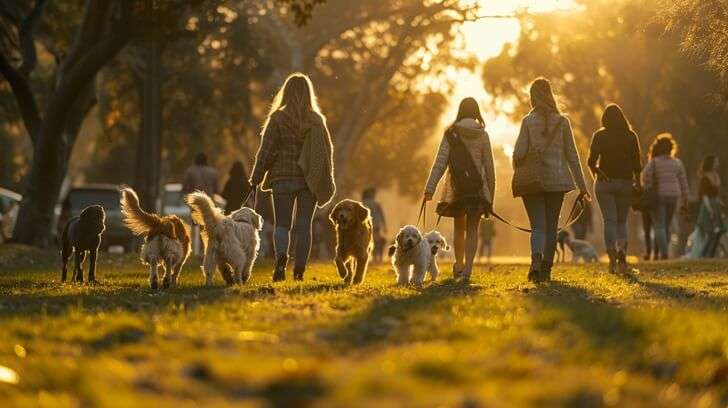
Socialization is a two-way street; it strengthens the bond between puppies and their owners. Engaging in socialization activities together—like visits to the park, puppy classes, or playdates—creates shared experiences that enhance the owner-pet relationship. Puppies that feel secure and confident in their surroundings are more likely to trust their owners, leading to a stronger, healthier bond.
Moreover, socialized puppies are typically more eager to engage with their owners, making training and daily interactions more enjoyable. This bond is essential for ensuring that your dog listens and responds to your commands, ultimately enhancing your relationship. When a puppy feels comfortable in various situations, they look to their owners for guidance and reassurance, reinforcing the trust between them.
A strong bond with your puppy leads to better communication, which is crucial for effective training. Dogs that trust their owners are more likely to respond positively to commands, making training sessions smoother and more enjoyable. As the bond strengthens, the dog’s responsiveness improves, creating a harmonious relationship based on mutual respect and understanding.
5. Prepares for Real-World Situations
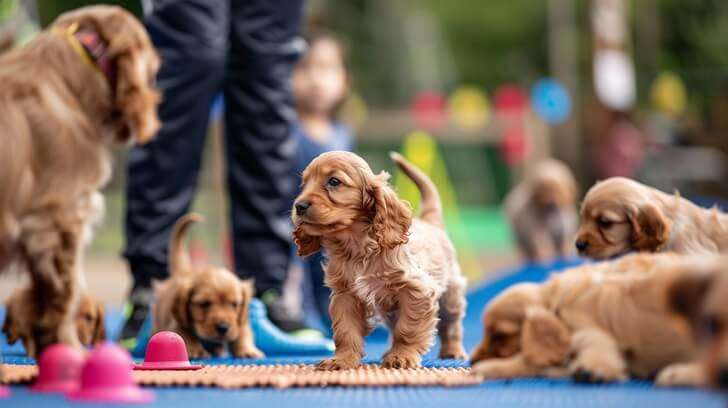
Life is full of unpredictable situations, and puppies need to be prepared for them. Early socialization helps puppies become accustomed to various real-world experiences, such as car rides, trips to the vet, and encounters with strangers. Puppies that lack this exposure may react fearfully or aggressively when confronted with new situations as adults.
By exposing your puppy to a variety of environments and stimuli, you can help them develop the resilience necessary to navigate the complexities of the world around them. This preparation is invaluable for preventing behavioral issues and ensuring your dog remains calm and confident in new situations.
For instance, if a puppy has been exposed to different environments and experiences, they are less likely to panic during a car ride or at the vet. A well-socialized puppy is more adaptable and can handle various situations with ease, contributing to their overall quality of life. This adaptability is critical in a world where new experiences and challenges arise regularly.
How to Socialize Your Puppy: A Step-by-Step Guide
Step 1: Start Early
Begin the socialization process as soon as you bring your puppy home, ideally before they reach 16 weeks of age. The earlier you start, the more effective your efforts will be. Introduce them to a variety of people, animals, and environments in a controlled manner.
Step 2: Gradual Exposure to Different Environments
Introduce your puppy to various environments gradually. Start with quieter places and gradually move to busier ones. Take your puppy on car rides, walks in the park, or visits to pet-friendly stores. Always ensure that these experiences are positive and stress-free.
Step 3: Positive Reinforcement

Use treats and praise to encourage positive interactions. When your puppy meets new people or animals, reward them with treats and affection for calm behavior. This positive reinforcement helps them associate new experiences with rewards, making them more likely to approach similar situations positively in the future.
Step 4: Puppy Classes
Enroll your puppy in a puppy kindergarten or socialization class. These classes provide a controlled environment for your puppy to interact with other dogs and people while under the supervision of a trained professional. Puppy classes also allow for structured learning, which can enhance your puppy’s training and social skills.
Step 5: Playdates with Other Dogs
Arrange playdates with other well-mannered dogs. Ensure that the dogs are vaccinated and healthy. Supervised playtime allows your puppy to learn social skills and proper behavior through interaction with their peers.
Step 6: Exposure to Different Sounds and Experiences
Expose your puppy to various sounds and experiences, such as doorbells, traffic noise, and household appliances. Gradually increase the volume of these sounds and pair them with positive experiences, such as treats or playtime, to help your puppy feel more comfortable.
Step 7: Ongoing Socialization
Socialization is not a one-time event; it’s an ongoing process. Continue to expose your dog to new experiences throughout their life. Regular outings, new environments, and different social interactions will help maintain your dog’s confidence and adaptability as they grow.
Common Mistakes and Challenges to Avoid
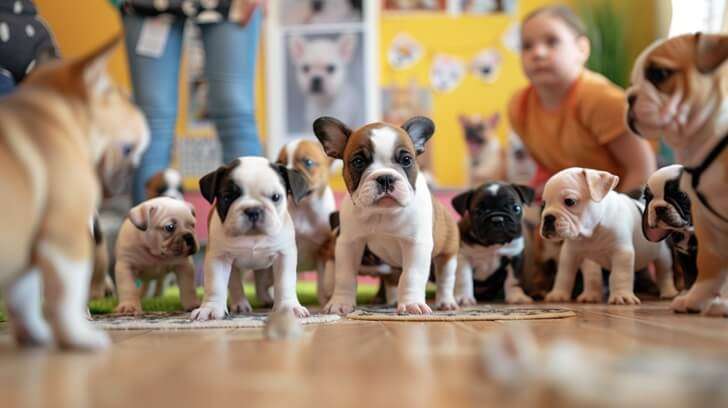
1. Overwhelming Your Puppy
One common mistake is overwhelming your puppy with too many new experiences at once. This can lead to stress and anxiety. Instead, introduce new experiences gradually and allow your puppy to acclimate at their own pace.
2. Neglecting Positive Reinforcement
Failing to use positive reinforcement during socialization can lead to negative associations. Always reward calm and confident behavior with treats and praise to ensure your puppy develops a positive outlook on new experiences.
3. Avoiding Socialization Due to Fear
Some owners may avoid socialization due to their own fears or anxieties about their puppy interacting with other dogs or people. It’s essential to work through these fears to provide your puppy with the socialization they need. Consider seeking professional help if necessary.
4. Lack of Consistency
Inconsistency in socialization efforts can hinder progress. Make socialization a regular part of your puppy’s routine to ensure they receive adequate exposure to different experiences over time.
5. Ignoring Warning Signs
Watch for signs of stress or fear in your puppy, such as cowering, growling, or hiding. If your puppy appears overwhelmed, take a step back and give them time to adjust. Pushing them too hard can lead to long-term behavioral issues.
Scientific Backing for Early Socialization
Numerous studies support the importance of early socialization in puppies. Research conducted by the American Veterinary Society of Animal Behavior emphasizes that early socialization is vital for preventing behavior problems in adult dogs. According to their guidelines, puppies should be socialized with various people, environments, and animals during their critical period to promote healthy development.
Moreover, studies show that puppies that experience positive socialization are less likely to exhibit fear-based behaviors later in life. A study published in the Journal of Veterinary Behavior found that well-socialized puppies showed significantly lower levels of fear and aggression compared to those who were not socialized adequately. This evidence underscores the importance of prioritizing socialization during the early weeks of a puppy’s life.
Conclusion
In conclusion, early socialization is a crucial aspect of puppy development that can significantly influence their behavior and well-being throughout their lives. By prioritizing socialization and exposing your puppy to various experiences in a positive manner, you can help them grow into a confident, well-adjusted adult dog. The benefits of socialization extend beyond just preventing behavioral issues; it fosters a stronger bond between you and your pet, enhances their learning ability, and prepares them for the challenges of the real world.

If you’re looking for comprehensive guidance on raising a happy, well-adjusted dog, consider investing in the Dog Trainer Bible. This invaluable resource offers insights and training techniques that will help you navigate the journey of dog ownership with confidence. Start your socialization efforts today and set the stage for a lifetime of companionship and joy with your furry friend!
